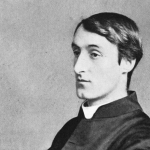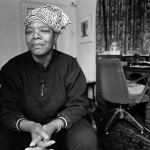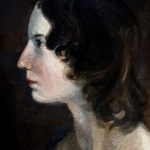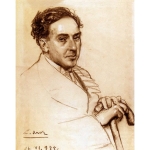My mother's maids, when they did sew and spin,
They sang sometime a song of the field mouse,
That, for because her livelood was but thin,
Would needs go seek her townish sister's house.
She thought herself endurèd too much pain;
The stormy blasts her cave so sore did souse
That when the furrows swimmèd with the rain,
She must lie cold and wet in sorry plight;
And worse than that, bare meat there did remain
To comfort her when she her house had dight;
Sometime a barley corn; sometime a bean;
For which she laboured hard both day and night
In harvest time whilst she might go and glean;
And where store was stroyèd with the flood,
Then well away! for she undone was clean.
Then was she fain to take instead of food
Sleep, if she might, her hunger to beguile.
"My sister," quod she, "hath a living good,
And hence from me she dwelleth not a mile.
In cold and storm she lieth warm and dry
In bed of down; the dirt doth not defile
Her tender foot, she laboureth not as I.
Richly she feedeth and at the richman's cost,
And for her meat she needs not crave nor cry.
By sea, by land, of the delicates, the most
Her cater seeks, and spareth for no peril.
She feedeth on boiled bacon meet and roast,
And hath thereof neither charge nor travail;
And when she list, the liquor of the grape
Doth glad her heart till that her belly swell."
And at this journey she maketh but a jape;
So forth she goeth, trusting of all this wealth
With her sister her part so for to shape,
That if she might keep herself in health,
To live a lady while her life doth last.
And to the door now is she come by stealth,
And with her foot anon she scrapeth full fast.
Th' other for fear durst not well scarce appear,
Of every noise so was the wretch aghast.
At last she askèd softly who was there.
And in her language, as well as she could,
"Peep!" quod the other. "Sister, I am here."
"Peace," quod the towny mouse, "why speakest thou so loud?"
And by the hand she took her fair and well.
"Welcome," quod she, "my sister, by the Rood!"
She feasted her, that joy it was to tell
The fare they had; they drank the wine so clear,
And as to purpose now and then it fell,
She cheerèd her with "How, sister, what cheer!"
Amids this joy befell a sorry chance,
That, well away! the stranger bought full dear
The fare she had, for, as she look askance,
Under a stool she spied two steaming eyes
In a round head with sharp ears. In France
Was never mouse so fear'd, for the unwise
Had not i-seen such a beast before,
Yet had nature taught her after her guise
To know her foe and dread him evermore.
The towny mouse fled, she know whither to go;
Th' other had no shift, but wonders sore
Feard of her life. At home she wished her tho,
And to the door, alas! as she did skip,
The heaven it would, lo! and eke her chance was so,
At the threshold her silly foot did trip;
And ere she might recover it again,
The traitor cat had caught her by the hip,
And made her there against her will remain,
That had forgotten her poor surety and rest
For seeming wealth wherein she thought to reign.
Alas, my Poynz, how men do seek the best
And find the worst, by error as they stray!
And no marvail; when sight is so opprest.
And blind the guide; anon out of the way
Goeth guide and all in seeking quiet life.
O wretched minds, there is no gold that may
No, no, although thy head were hooped with gold,
Sergeant with mace, hawbert, sword, nor knife,
Cannot repulse the care that follow should.
Each kind of life hath with him his disease.
Live in delight even as thy lust would,
And thou shalt find, when lust doth most thee please,
It irketh straight and by itself doth fade.
A small thing it is that may thy mind appease.
None of ye all there is that is so mad
To seek grapes upon brambles or breres;
Nor none, I trow, that hath his wit so bad
To set his hay for conies over rivers,
Ne ye set not a drag-net for an hare;
And yet the thing that most is your desire
Ye do mis-seek with more travail and care.
Make plain thine heart, that it be not knotted
With hope or dread, and see thy will be bare
From all affects, whom vice hath ever spotted.
Thyself content with that is thee assigned,
And use it well that is to thee allotted.
Then seek no more out of thyself to find
The thing that thou hast sought so long before,
For thou shalt feel it sitting in thy mind.
Mad, if ye list to continue your sore,
Let present pass and gape on time to come,
And deep yourself in travail more and more.
Henceforth, my Poynz, this shall be all and some,
These wretched fools shall have nought else of me;
But to the great god and to his high doom,
None other pain pray I for them to be,
But when the rage doth lead them from the right,
That, looking backward, Virtue they may see,
Even as she is, so goodly fair and bright;
And whilst they clasp their lusts in arms across,
Grant them, good Lord, as Thou mayst of Thy might
To fret inward for losing such a loss.




















Comment form: